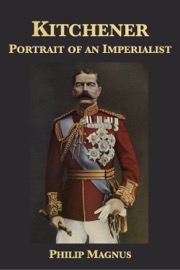 $9.99 on Kindle
$9.99 on KindleKitchener: Portrait of an Imperialist by Philip Magnus (151,000 words, 26 illustrations)
Horatio Herbert Kitchener (1850-1916) was a British Field Marshal and colonial administrator famous for his military campaigns and who later played a central role in the early part of the World War I. Kitchener won fame in 1898 for winning the Battle of Omdurman and securing control of the Sudan, after which he was given the title “Lord Kitchener of Khartoum”. As Chief of Staff (1900–02) in the Second Boer War he played a key role in the conquest of the Boer Republics. His term as Commander-in-Chief (1902–09) of the army in India saw him quarrel with the Viceroy, Lord Curzon, who eventually resigned. Kitchener then returned to Egypt as its de facto administrator.
In 1914, at the start of the World War I, Kitchener became Secretary of State for War. One of the few to foresee a long war, he organized the largest volunteer army in the world, and a significant expansion of materials production to fight Germany. He was idolized by the British public, appearing on recruiting posters demanding “Your country needs YOU!” that are still part of popular culture. Despite having warned of the difficulty of provisioning Britain for a long war, he was blamed for the shortage of high-explosive shells in the spring of 1915 and stripped of his control over munitions and strategy. Kitchener died in 1916 when the warship taking him to negotiations in Russia was sunk by a German mine.
“Sir Philip Magnus gives us a ruthlessly objective account of [Kitchener’s] life... [His] narrative is a model of perception and clarity, and with it he blends a wealth of fascinating quoted source material, new and old. The combination is a biography to end all biographies of Lord Kitchener.” — Leon Wolff, The New York Times
“A biographical masterpiece” — New Statesman
“A great achievement... it will remain an indispensable work of reference... the author has conducted his historical research with industry and thoroughness... Kitchener's failings and failures have been recognised when setting out his virtues and achievements.” — Warren Perry, The Australian Quarterly
“[Kitchener’s] inner flaws as well as the visible front are starkly apparent... for those who enjoy and profit from the study of personalities, motivations, and the crosscurrents which pull from all sides on men in high public office, this book will prove to be a valuable addition.” — Maj. Keith C. Nusbaum, Military Review



